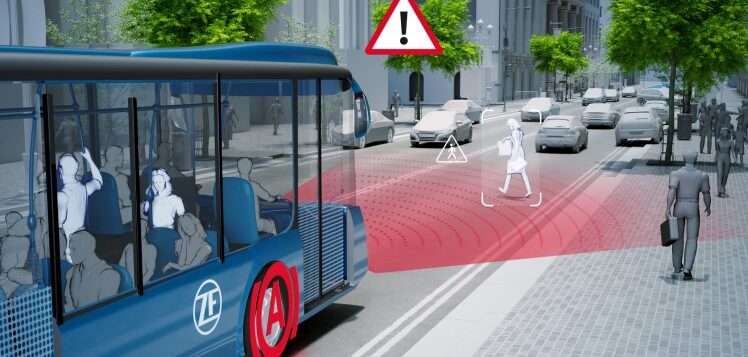Tier 1 automotive supplier ZF is to launch a pioneering Collision Mitigation System (CMS) for city buses. Offering active braking to help avoid frontal collisions with other road users, including vehicles, bicycles and pedestrians, the system also helps counter the adverse impact of braking momentum on passengers.
Stated to be the industry’s first original equipment manufacturer-independent (OEM) CMS specifically engineered for city bus applications, the system is compatible with both electric and internal combustion engines. Having already secured business wins from leading bus OEMs, ZF will initially launch its City Bus CMS in Europe and, ultimately, plans to roll the system out worldwide.
“Leveraging ZF’s wide-ranging competencies to develop a pioneering solution connecting radar and camera with a central processing unit and braking system, City Bus CMS represents a clear proof point of the Group’s Next Generation Mobility strategy,” said Philipp Helmich, head of vehicle dynamics product lines with ZF’s Commercial Vehicle Solutions division. “The system addresses the clear and pressing demand from manufacturers and their customers for ever-higher levels of safety in city traffic.”
“In addition to providing advanced, integrated safety for road users as well as the driver and passengers of both electric and traditionally fueled buses, we are extending ZF’s advanced driver assistance systems leadership in trucks and coaches to the important city bus market segment. Utilizing advanced braking system technology is fundamentally important for safety and autonomous driving, with complex city bus applications providing an interesting and valuable use case,” added Helmich.
Helping mitigate hazardous traffic situations in the complexity of an urban environment requires sophisticated situational analysis, including advanced object detection and classification. The City Bus CMS draws on its ZF’s OnGuardMAX technology for heavy trucks, with specific features and functionalities tailored to city bus applications. Combining the data from its camera and radar provides continuous analysis of the traffic situation. If an impending collision is detected, the system can issue a Forward Collision Warning (FCW) and automatically apply the brakes to help mitigate or avoid an accident.
ZF notes that the braking systems are precisely calibrated with the vehicle’s speed and weight, meaning the adverse effects of sudden braking on passengers can also be minimized, with brake pressure applied across the braking cascade making passengers less likely to be jolted and put off-balance.


